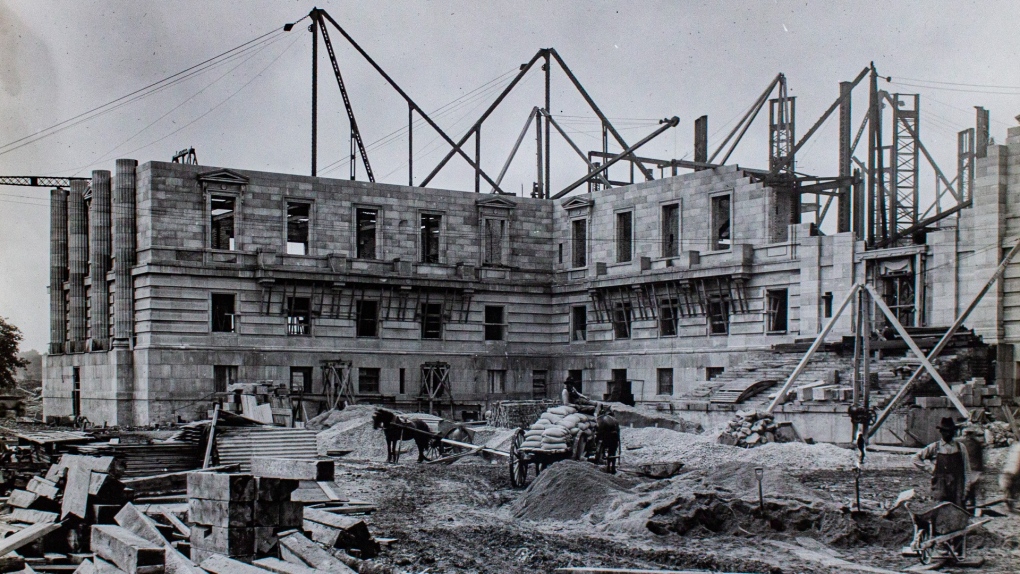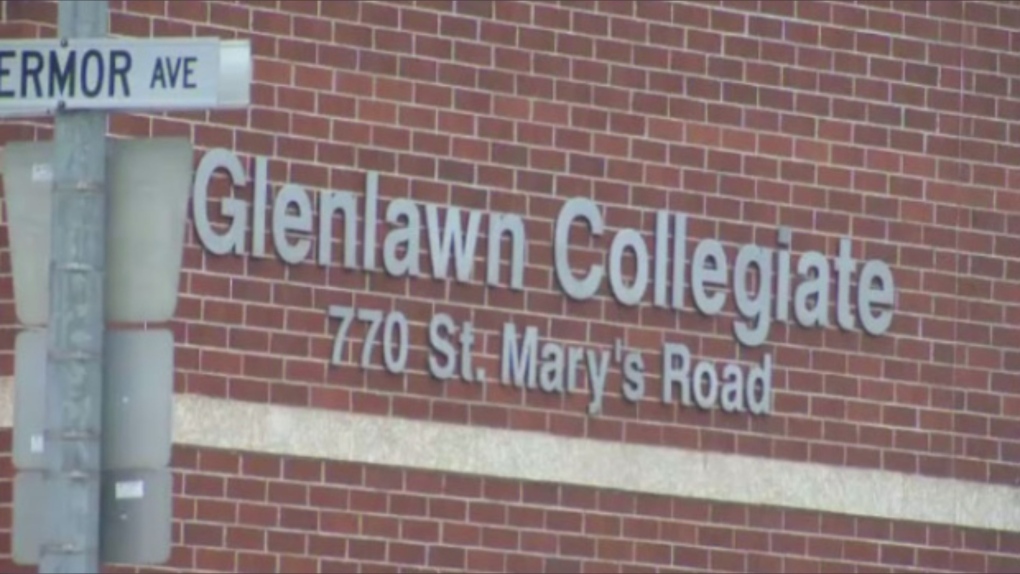Celebrating a century: What's marking 100 years in Winnipeg
Between 2020 and 2023 several Winnipeg businesses and organizations have or will be celebrating the century mark.
Places like Glenlawn Collegiate, Isaac Newton School, Daniel McIntyre Collegiate Institute, the Manitoba Legislature, Niakwa Country Club, as well as the Winnipeg Youth Orchestras, and the Winnipeg Foundation, are just a few of the organizations to mark the significant milestone.
 Historical photos show the slow construction as the grand epicentre of Manitoba politics began rising from the ground in 1913. It was completed in 1920.
(Source: Archives of Manitoba, Archives of Manitoba photo collection, Legislative Building / Broadway 61-80, ca. 1916-1917, P1185.)
Historical photos show the slow construction as the grand epicentre of Manitoba politics began rising from the ground in 1913. It was completed in 1920.
(Source: Archives of Manitoba, Archives of Manitoba photo collection, Legislative Building / Broadway 61-80, ca. 1916-1917, P1185.)
But what was Winnipeg like 100 years ago and what has allowed so many organizations to make it to this point?
Dan Furlan, the president of the Manitoba Historical Society, said before the 1920s, Winnipeg was one of the major hubs in Canada.
"Winnipeg was a jumping-off point and all the warehouses, stuff was shipped to Winnipeg, it was split up and sent off to different places out west," said Furlan.
He said at one point, Winnipeg was known as the Paris of the prairies. It was due to spectacles like the ballet and the opera and it brought people to the city.
"This is where all the entertainment came to. Charlie Chaplin and all those characters, in the early days, the Vaudeville circuit. Winnipeg was the main hub for that."
However, the Winnipeg that was had to shift, mainly due to the completion of the Panama Canal in 1914.
Furlan said it became cheaper for companies to ship through the Canal and population growth started to happen in other cities like Toronto and Vancouver.
Despite the changes, several organizations still started to pop up around the city in the 1920s – and they are still around to this day.
"There's a few that have last 110, 120 (years), but now I'm seeing that there was a large number of firms that were established…even though it was tough times," said Furlan. "A lot of organizations, establishments have survived."
When asked why they were able to start and survive even with Winnipeg shifting away from its former self, Furlan said the city's reputation helped keep people interested.
"I used to live in Ottawa and I dated a woman who came from Regina and she says, 'Oh, Winnipeg. That was really the place. That was the cultural centre of the west.'"
THE ARTS LIVE ON
For Andrea Bell, it is exciting for her to know a program dedicated to music and young people has been able to stick around all this time.
She is a conductor in the Winnipeg Youth Orchestras and used to be a member when she was growing up.
Since its inception, the orchestra has gone through several names, but Bell said the theme of having a place for young people to play has remained throughout the 100 years of playing.
"I think there was always a strong tradition of orchestral playing in Winnipeg. So I think there were a lot of people that decided it would be important to have youth getting involved in that," said Bell.
Bell agreed with Furlan's comments about Winnipeg being an arts and cultural hub in the west, saying it played a big role in the formation of the orchestra.
"Winnipeg is a community that was always very supportive of the arts and has always been like that and very encouraging towards everybody doing art."
She believes Winnipeg's art history allowed the youth orchestra to stay around and no matter what was happening in the city, residents still had art and music to fall back on.
This year, the orchestra is celebrating 100 years with a massive concert – bringing all three age groups together, plus alumni - playing Tchaikovsky's Fourth Symphony.
Bell said throughout the years, those who have participated in the orchestra have been able to enrich their lives and become better people for it. Some people she knows have gone on to be musicians who play in the top orchestras, while others have used the experiences in other aspects of their lives.
"The goal is not to become a professional musician. The goal is, how do you work in a team? How do you work hard by yourself...I think a lot of people realize that taking music is an important skill, not for the music's sake, but for the self-discipline and the community."
Looking to the next 100 years, Bell hopes the orchestra will eventually have a permanent space where they can practise and perform and see continued funding to bring as many people into the program as possible.
THE IMPACTS OF LIQUOR MARTS HISTORY IN WINNIPEG AND MANITOBA
Another organization that has been able to mark 100 years is Liquor Mart. Present day it isn't hard to find a liquor store and there are endless options to choose from.
But looking back 100-plus years ago, the liquor industry started small in Winnipeg, but as the population grew, so did the number of places to buy booze.
"Winnipeg in 1870, when it was still just a village, Winnipeg had five hotels where they served alcohol," said Roland Sawatzky, the curator of history at the Manitoba Museum.
"Twelve years later, there were 86 hotels, 64 grocery stores that sold booze, five breweries, and 24 liquor shops. And by 1913, when Winnipeg was the third-largest city in Canada, there were 243 saloons. So all of this corresponded to the population boom."
Sawatzky said the issue with the old system was there weren't many regulations and it brought a lot of perceived social problems in the city and Winnipeg became known as a "hard-drinking place."
"There was a real push for prohibition to end these perceived social problems…so people were voting for prohibition over and over again, but it never really took because the government realized all these hotels were employing a lot of people."
It wasn't until 1916, when the Tobias Norris-led Liberal Party took power and prohibition took shape.
Sawatzky said arrests for public drunkenness dropped once prohibition took effect, but several loopholes allowed people to get alcohol, so the social problems continued.
"The abuse of the law was so flagrant, the business and tax revenue from the liquor trade was such a loss for the government, that by the early 1920s, Manitobans voted to bring back liquor, but under strict government control."
This government control led to the creation of the Liquor Control Act in 1923, which eventually turned into Manitoba's Liquor Control Commission.
Since then, there have been many milestones over the 100 years. New-style stores – what Manitobans are more used to today – were first introduced in 1965. Before then, customers would write their orders on a slip and a clerk would grab the alcohol.
Women were allowed to start working in government liquor stores in 1971 and in 2001 the sale of liquor was allowed on Sundays.
"It's been 100 years of basically relaxed, slowly relaxing liquor laws," said Sawatzky.
Looking at the present day and into the future, Sawatzky said there will probably be a lot of questions about Liquor Mart and how it continues to run, especially given the recent strike that swept the province.
However, he said prohibition and Liquor Mart is a big part of the province's history.
"It points to the issues with massive expansion of the population here. It links into all kinds of other things like social reform, like voting rights, like immigration…it was a time when people started thinking about government regulation very seriously."
One of the successes of the commission over the last 100 years according to Sawatzky is the ability to adapt. He said it is a major factor in being able to hit the century mark.
"They realized when society started to change that the way they ran things had to change as well."
LOOKING AT THE NEXT 100 YEARS IN WINNIPEG
Adaptability is a key sticking point for Furlan, who said those who are starting up in Winnipeg need to be prepared to roll with the punches if they are looking to be around 100 years from now.
"They have to be focused on adaptability and quality advice. Now, on top of that, you have to be smart," said Furlan.
"I think we have to make the best of what we have here on the prairies and be a destination."
He notes any current or future organizations need to be prepared to engage with all demographics that Winnipeg has to offer.
"How do you engage with the Indigenous Chamber of Commerce? How do you engage with all the newcomers? There are a lot of newcomer organizations for people immigrating here. And what about the people that live here now, so how do you make sure the whole population is engaged?"

CTVNews.ca Top Stories

Donald Trump says he urged Wayne Gretzky to run for prime minister in Christmas visit
U.S. president-elect Donald Trump says he told Canadian hockey legend Wayne Gretzky he should run for prime minister during a Christmas visit but adds that the athlete declined interest in politics.
Historical mysteries solved by science in 2024
This year, scientists were able to pull back the curtain on mysteries surrounding figures across history, both known and unknown, to reveal more about their unique stories.
King Charles III focuses Christmas message on healthcare workers in year marked by royal illnesses
King Charles III used his annual Christmas message Wednesday to hail the selflessness of those who have cared for him and the Princess of Wales this year, after both were diagnosed with cancer.
Mother-daughter duo pursuing university dreams at the same time
For one University of Windsor student, what is typically a chance to gain independence from her parents has become a chance to spend more time with her biggest cheerleader — her mom.
Thousands without power on Christmas as winds, rain continue in B.C. coastal areas
Thousands of people in British Columbia are without power on Christmas Day as ongoing rainfall and strong winds collapse power lines, disrupt travel and toss around holiday decorations.
Ho! Ho! HOLY that's cold! Montreal boogie boarder in Santa suit hits St. Lawrence waters
Montreal body surfer Carlos Hebert-Plante boogie boards all year round, and donned a Santa Claus suit to hit the water on Christmas Day in -14 degree Celsius weather.
Canadian activist accuses Hong Kong of meddling, but is proud of reward for arrest
A Vancouver-based activist is accusing Hong Kong authorities of meddling in Canada’s internal affairs after police in the Chinese territory issued a warrant for his arrest.
New York taxi driver hits 6 pedestrians, 3 taken to hospital, police say
A taxicab hit six pedestrians in midtown Manhattan on Wednesday, police said, with three people — including a 9-year-old boy — transported to hospitals for their injuries.
Azerbaijani airliner crashes in Kazakhstan, killing 38 with 29 survivors, officials say
An Azerbaijani airliner with 67 people onboard crashed Wednesday near the Kazakhstani city of Aktau, killing 38 people and leaving 29 survivors, a Kazakh official said.

































